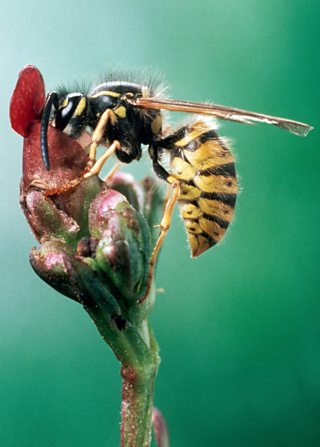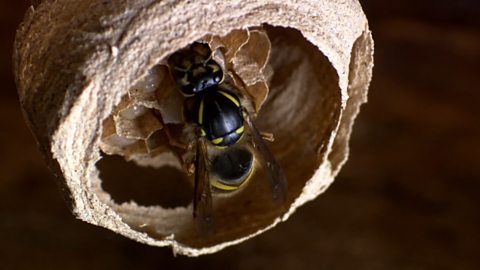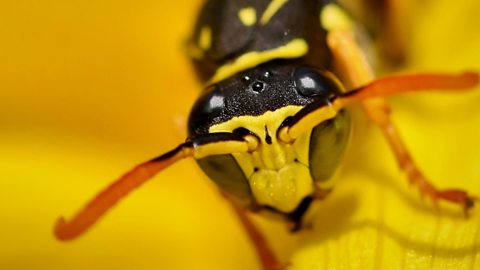King of the stingers: Are we too harsh on wasps?
Wasps have a very bad reputation. Unlike their fluffy, beloved cousins the bees, wasps don’t make honey and don’t look good in cartoon form on a cereal box. And so they have been branded the “thugs of the insect world” and are thought to be vindictive, malicious, angry picnic-ruiners. But is this classification unfair? Drs Rutherford and Fry opened up one of their Curious Cases to reassess all things vespa related.
They were here first!

A single wasp colony in your back garden could be removing as many as 250,000 aphids during a season.
As expert and self-proclaimed “wasp lady” Seirian Sumner told the show: “They are the evolutionary route of all bees and ants.” Wasps have been around for 250 million years and ants and bees all evolved from wasp-like ancestors. Bees can be thought of as wasps that have forgotten to hunt and ants are wasps that have lost the ability to fly. They are the young pretenders while wasps are the granddaddies of the insect world.
A few bad apples
There are a staggering 150,000 species of wasp and only a tiny, tiny minority cause us trouble. In the UK it is just two species of what are known as Yellowjackets, the Common Wasp and the German Wasp, that are the sort that we flap at during picnics. Many wasps are of the parasitoid variety. They don’t have a sting and resemble tiny flies.
They’re great pest controllers
Parasitoid wasps are excellent at destroying other insects that damage crops. Though they don’t do it in a particularly pleasant way. They lay their eggs in the larvae of the pests and then the wasp babies eat their way out. It’s been suggested that, in the way beehives are set up near fields to help with pollinating, wasp colonies could also be moved near to pest-riddled crops to protect them. And it’s not just in agriculture that they’re handy. It’s been estimated that a single wasp colony in your back garden could be removing as many as 250,000 aphids during a season.
They’re not fussy
And speaking of pollinating, while wasps are primarily hunters, they do pollinate as well. In fact, unlike those picky bees who choose the same sort of flower over and over again, they are happy to land on all sorts of plants. One study recorded wasps visiting and pollinating over 600 species of different fauna. Another has shown that in the absence of bumblebees as pollinators, the introduction of Paper Wasps can completely, and successfully, replace them.
The anti-social ones are the social ones
The anti-social varieties of wasp that bother us at picnics are actually known as social wasps as they live in large colonies, while it is the wasps that don’t bother us and live solitary existences outside colonies that are social to us but anti-social towards other wasps, including the social wasps. Wasp colonies are very sophisticated; they have a queen who lays all the eggs, while the rest are workers who keep the colony going. Only the queen lives through the winter; all the workers die off and she is responsible for starting the colony off from scratch the next year.

The importance of wasps
Chris Packham answers the age-old question, "What are wasps for?"
They only bother us for a bit
Wasps only tend to use humans and their picnicking items as a food source for a couple of weeks towards the end of summer.
Though they have a reputation for constantly forcing the abandonment of al-fresco dining, in fact wasps only tend to use humans and their picnicking items as a food source for a couple of weeks towards the end of summer. By that point, a wasp colony no longer contains any larvae. These larvae normally produce a sugary secretion that feeds the worker wasps. Once they are gone, the workers still need energy and so are attracted to anything sugary we have on our tablecloths.
They can be defeated
Hornets are the largest of the social wasps and canny predators, though some of their prey have evolved an ingenious way to protect themselves. The giant Asian hornet is a vociferous eater of the Japanese honeybee. But the bees realised that they can survive at a slightly higher temperature than hornets so when a hornet approaches, the bees pile on to it, vibrating and flapping their wings, which raises the temperature just enough to “bake” their enemy and kill it.

What if all the wasps disappeared?
麻豆官网首页入口 Ideas explores what a world without wasps would be like
They can be too successful
"Wasps invented paper millions of years before we even thought about it."Entomologist Serian Sumner
Wasps were accidentally introduced into New Zealand just after the Second World War when some shipped aircraft parts had over-wintering German wasp queens inside. They escaped and quickly established themselves as they didn’t have any natural enemies and they’re great at adapting to new food sources. The wasps soon expanded and now in the New Zealand beech forests during the Summer months, wasps make up the largest biomass; greater than everything else put together, with some of their nests growing to three metres in height.
They invented books! (possibly)
According to Serian Sumner: “Wasps invented paper millions of years before we even thought about it.” It is possible that the origin of humans learning how to make paper comes from the observation of paper wasps. One, potentially fabulous, story states that an ancient Chinese eunuch was watching a Paper Wasp strip bark, chew it up and then apply the papery material to its nest and decided this was a pretty nifty idea, so went off and invented paper.



















